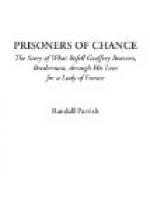“But they were of strong heart,” he went on at last, never looking at me, “and returned again, until finally war arose between my people and these white-faced Francais. Many came up the great river from the salt water in big boats, and drove us forth from our village, the home of our fathers, and gave it up to fire, after killing many warriors. We could not fight against their fire-sticks, yet we saved much that we valued, and wandered far toward the sunset, bearing along with us the bodies of our chiefs, and the sacred fire from our altar. The Francais lost us in the wilderness. We came to a little river which flowed down to greet us from out the sunset. Here we stopped once more, built our village, erecting about it a great wall of earth such as our fathers did in those days when we were strong and mighty. We dwelt there in peace for three seasons of sun and cold, having little trouble with those tribes that roamed about us, until one day there came into our new village another Francais, a black-robe. How he got there I know not, but we laid hands upon him,—remembering the past,—bound him before our altar-house, and made of him a sacrifice unto our god, the Sun. Yet it was not well. Even that very night, while we worshipped before the fire which had consumed him, there came upon us many Francais out from the dark woods, with fire-sticks and sharp knives, so that only few of our people escaped, and got away to the north. I was one, bearing ever with me the sacred fire, which I was sworn to guard. We travelled across many rivers, suffering much from want, until those who lived wandered to this place, and here set up once more our fathers’ ancient altars. ’T was thus I learned the words of the tongue, this accursed Francais, and learned also to hate those with white faces and black hearts who speak it.”
His voice ceased, and his chin sank wearily upon his breast. My ear caught the heavy breathing of Cairnes, and I turned to mark him lying at full length upon the stone floor sound asleep. Admiring his indifference to surroundings, I was yet so deeply engrossed in this tale of the old priest as to be myself insensible of fatigue.
“You are indeed of an old race,” I said, hoping to make him talk further, “if the traditions of your people extend to those first Frenchmen who came floating south along the great river.”
The old eyes, now scanning my face, gleamed with awakened pride.
“’T is no more than a page out of our history I have related,” he exclaimed hastily, evidently aroused by my interest. “We are the oldest and greatest people of the earth. Ay, more; we are children of the Sun, and, ages ago, when our fathers were true to their faith and their God, there were none who could contend against us. We had our great altars on every hilltop, and our villages were in every valley. Our kings ruled from far above the great fresh water down to where the salt sea kisses the white sand; our slaves toiled in the fields to produce us food, and in the rocks to give us store of metal for the chase and war. It was then the Sun shone warm upon his children, and there were none among men who dared to face our warriors in battle. We were masters of all the land we trod; we feared no people, for we were blessed of the Sun.”




